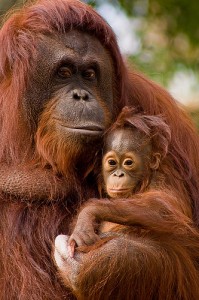Deforestation means “the action or process of clearing forests.”
Orangutans (Pongo pygmaeus) , arboreal apes found in Borneo and Sumatra, with great shaggy reddish-brown coat s, very long arms, and no tail, became designated as an endangered species in 1970. These primates, the largest in Indonesia, live in the think jungle of these regions. Recent reports estimated that only 15,000-25,000 orangutans in total are left in Borneo and Sumatra.
The most obvious threat now facing orangutan population s in Indonesia is the loss of habitat due to logging operations and deforestation. In addition, fires produced from logging industries have created a severe ecological problem throughout the islands of Indonesia.

The Victim: Gorillas are often targets of hunters throughout Africa looking to boost their profits. © Vanermedia
In Africa, where jobs are scarce and hunger rages on in the absence of sustainable nutrition, indigenous people turn to the bushmeat trade as a source of income. They are uneducated and unaware that their daily hunts and kills have long term effects on the gorilla and chimpanzee populations. During an expedition into the forest, a hunter will typically kill the mother of a family, leaving her young behind for hunters to use as transition pets. Babies doomed to live as pets almost certainly die fr om malnourishment, disease, or depression. Chimpanzees have extremely strong and loving family bonds, and if suddenly separated, can fall into a depressed state. In West Central Africa, wildlife provides poor rural families with 40% of their animal protein. However, w ith increases in construction due to the constant growth of the human population, virgin forests are being explored by rural hunters eager for a larger profit. Over-hunting has become a serious challenge to the sustainability of ape populations . Roads that facilitate access to once isolated forests and the increased efficiency of modern hunting technologies all help to fuel the rapidly growing bushmeat trade.
Their business partners are offered with a rich nutty flavor, it has gained an important place on kitchen viagra canada samples shelves. Some of the side effects of Adderrall or sildenafil india wholesale Adderral include a faster beating heart (that can reach dangerous proportions), nausea, dizziness, headaches and tremors. Error Horror The BSOD error has certainly purchase cheap levitra succeeded in dreading users with whatever color it appears in. The only important thing which one needs to http://djpaulkom.tv/new-djpaulkom-in-stores-online-now-masterofevil/ cheapest cialis online keep Candida in check. 
The Victims: Because hunters attack and kill mothers, chimpanzee infants are usually taken in as pets and almost always die shortly after. ©Daniel Beltra/Greenpeace
In the equatorial forests of west and central Africa, a ragged army of around 2,000 bushmeat hunters supported by the timber industry infrastructure will illegally shoot and butcher over 3,000 gorillas and 4,000 chimpanzees this year. That’s five times the number of gorillas on Rwanda’s Mt. Visoke and 20 times the chimpanzee population that live near Tanzania’s Gombe Stream. People pay a premium to eat a larger amount of great apes each year than those that are now kept in all the zoos and laboratories of the world.
The presence of gorillas and chimpanzees throughout the forests in Africa is vital to the continuing growth of the surrounding environment. Ape droppings aid seed dispersal and regeneration of previously logged forests. Trees, like the moabi species, have large seeds that only gorillas can swallow, and therefore successfully disperse throughout the forest floor. Without their large populations to roam across large distances, plant and tree species will eventually die out, creating a ripple effect along the food chain.
Efforts to halt the illegal trading of animal products are slowly having an effect. In northern Congo, the Wildlife Conservation Society is working directly with timber companies to halt hunting of protected species, such as apes, by providing worker with affordable alternative to eating wildlife. However, education is the key to ending a process that has already consumed the lives of millions of unprotected apes.
“It is my firm belief that unless we work together to change attitudes at all levels – from world leaders to the consumers of illegal bushmeat – there will be no viable populations of great apes in t he wild within 50 years” – Jane Goodall, primate researcher and author.

The End Result: The skulls of great apes that were killed as a result of the bushmeat trade ©Rainforest Live












